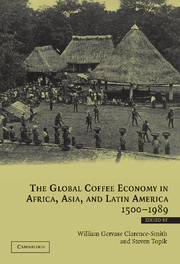Book contents
- Frontmatter
- Contents
- World coffee production
- Guatemala and Mexico
- Nicaragua and Costa Rica
- Brazil
- Cameroon
- Madagascar and Réunion
- East Africa
- Red Sea
- Ceylon and South India
- Java
- Introduction: Coffee and Global Development
- I ORIGINS OF THE WORLD COFFEE ECONOMY
- II PEASANTS: RACE, GENDER, AND PROPERTY
- III COFFEE, POLITICS, AND STATE BUILDING
- 11 Coffee and the Recolonization of Highland Chiapas, Mexico: Indian Communities and Plantation Labor, 1892–1912
- 12 Comparing Coffee Production in Cameroon and Tanganyika, c. 1900 to 1960s: Land, Labor, and Politics
- 13 Smaller Is Better: A Consensus of Peasants and Bureaucrats in Colonial Tanganyika
- 14 On Paths Not Taken: Commercial Capital and Coffee Production in Costa Rica
- 15 Coffee and Development of the Rio de Janeiro Economy, 1888–1920
- Conclusion: New Propositions and a Research Agenda
- Appendix: Historical Statistics of Coffee Production and Trade from 1700 to 1960
- Index
15 - Coffee and Development of the Rio de Janeiro Economy, 1888–1920
Published online by Cambridge University Press: 01 September 2009
- Frontmatter
- Contents
- World coffee production
- Guatemala and Mexico
- Nicaragua and Costa Rica
- Brazil
- Cameroon
- Madagascar and Réunion
- East Africa
- Red Sea
- Ceylon and South India
- Java
- Introduction: Coffee and Global Development
- I ORIGINS OF THE WORLD COFFEE ECONOMY
- II PEASANTS: RACE, GENDER, AND PROPERTY
- III COFFEE, POLITICS, AND STATE BUILDING
- 11 Coffee and the Recolonization of Highland Chiapas, Mexico: Indian Communities and Plantation Labor, 1892–1912
- 12 Comparing Coffee Production in Cameroon and Tanganyika, c. 1900 to 1960s: Land, Labor, and Politics
- 13 Smaller Is Better: A Consensus of Peasants and Bureaucrats in Colonial Tanganyika
- 14 On Paths Not Taken: Commercial Capital and Coffee Production in Costa Rica
- 15 Coffee and Development of the Rio de Janeiro Economy, 1888–1920
- Conclusion: New Propositions and a Research Agenda
- Appendix: Historical Statistics of Coffee Production and Trade from 1700 to 1960
- Index
Summary
Introduction
Brazil has had the world's most successful coffee economy since the middle of the nineteenth century. This chapter evaluates the impact of the coffee economy on the development process of Rio de Janeiro state. This analysis studies the effects of the expansion of coffee exports as the “staple” sector in the meaning of Watkins, Baldwin, and Hirschman linkage effects. Unlike in most other coffee countries, coffee exports in Brazil triggered a vigorous process of industrial development, first in the city and state of Rio de Janeiro then in a more pronounced fashion in the city and state of São Paulo. We are concerned with the reasons why coffee in Rio de Janeiro after the abolition of slavery in 1888 more closely resembled the development of other coffee economies than the spectacular (and unusual) income-multiplying effect it had in São Paulo. To fully understand Brazil's participation in the world coffee economy, one has to study regional and subregional diversity.
Economic development could be seen as a diversification process of economic activities around an export-led productive basis; the leading products determine the dynamism of economic growth. This interpretation of export-led growth centers on the dynamism induced in the economy by incomes generated in the export sector. They stay in the capital circuit by their capacity to stimulate investments in their productive chain, both upstream and downstream, and on the income brought about by the expansion of exporting activity.
- Type
- Chapter
- Information
- Publisher: Cambridge University PressPrint publication year: 2003



